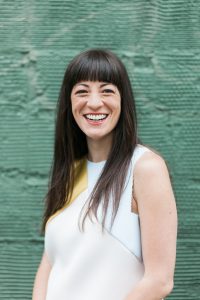Biography
Hana Etsuko Dethlefsen has applied her degrees in Education from UBC to various roles in museums in both Vancouver and London, England. She is currently the Exhibitions Manager at the Francis Crick Institute, a biomedical research centre in London, England.
Whether working as a curator, exhibits manager, project manager, or educational programmer, her focus is always on the audience and making their experiences meaningful, accessible, and impactful. With a specialty in science museums and interactive science centres, she is passionate about creating exhibits and environments that reveal ways in which science matters to us all.
On the side, Hana explores her Japanese heritage through food and has taught Japanese Culinary Arts for UBC Continuing Studies. Her M.Ed. degree included writing a user-experience informed curriculum for her cooking class and resulted in her Japanese cookbook Let’s Cooking. This book was developed with input from her cooking students and ended up giving her a chance to present Japanese recipes on Canada’s Gusto TV.
Meeting Hana
What is your most memorable experience from your time in the Faculty of Education?
Rather than a particular experience, it’s the people who are the most memorable part of my experience. I’m still well-connected to my BEd. cohort colleagues, and while their camaraderie and support during our program was important, they’ve taken on an even more important role as the years have gone on. Many of them remain classroom teachers, and their point of view, their experiences, and their views on museum experiences have helped me to stay connected and true to family and educational audiences.
Where has your education from the Faculty of Education taken you in your career?
I started off training as a primary school educator, moved on to working at a secondary school, and ended up in museum work. Starting in educational programming, I eventually moved over to working in exhibition development, and I’ve been fortunate enough to work in several fantastic places, including the H.R. MacMillan Space Centre, the Beaty Biodiversity Museum, Science World, the Science Museum in London, and now the Francis Crick Institute. Although it seems unlikely for a classroom teacher to end up curating and managing science exhibitions, the training I’ve received in education has been an incredibly strong base for creating exhibitions that really put audiences at their heart.
I never would have guessed at the beginning of my Education studies that I would have moved out of the classroom and into museums. When teaching, I found I really enjoyed the lesson planning, and loved imagining interactive, active ways for learners to experience ideas. In exhibitions, I’ve found a job that allows me to creatively plan educational experiences that manifest as a physical, sensory experience.
Where do issues of inclusion find a place in your life or at work?
Inclusion has always been at the core of my work in science education and exhibitions. For decades, science education (and therefore science exhibitions) have been on a mission to diversify who participates in and identifies with science. For me, that means that not only do my exhibitions need to be appealing, accessible, and meaningful for diverse audiences, but also that they need to see the diversity of people who work in science. At my current role at the Francis Crick Institute, I’m blessed to work in a place that hires talented scientists from around the world. I’m very much looking forward to showcasing their incredible work through our gallery program.
Do you have any words of wisdom for current students? Newly graduated folks?
For both students and new graduates – I encourage you to take risks. Whether that’s in choosing elective courses that push you in directions that are non-traditional, or whether that’s in leaving the safety of classroom teaching and moving into informal educational spaces, I have only ever benefited from trying something new, different, and even uncomfortable. Your training in education is applicable in so many different ways – don’t let existing systems define how you use it.
